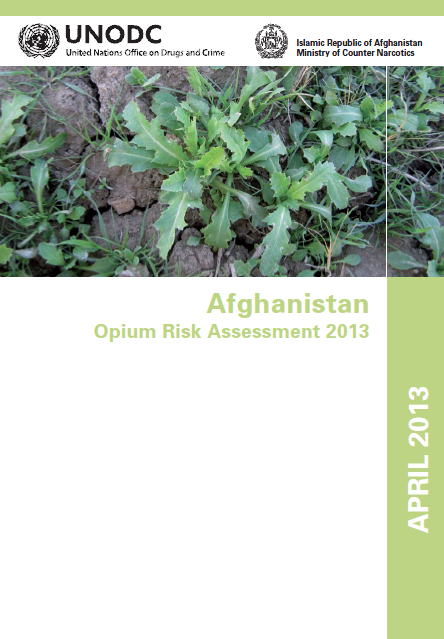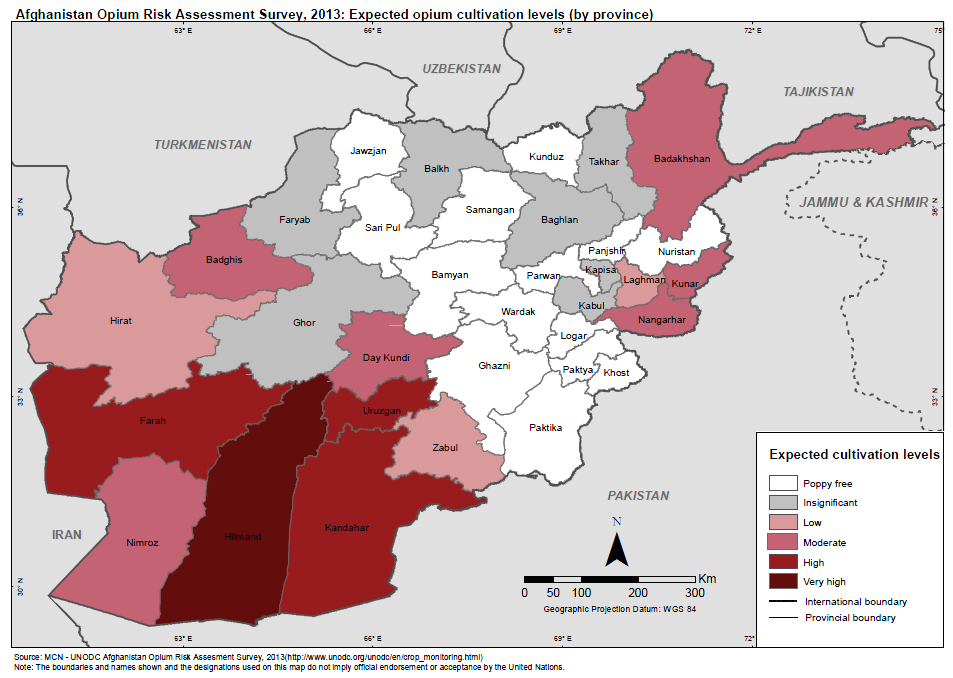Afghanistan Opium Winter Risk Assessment 2013 (Phase 1&2)
- 34 pages
- April 2013
In 2013, the Opium Risk Assessment was carried out in two phases similar to the year before. The first phase was implemented between December 2012 and January 2013 and covered the Central, Eastern, Southern and Western region, where opium was sown in fall 2012.
The second phase took place in February-March 2013 and covered the Northern and North-eastern regions, where opium poppy is mainly cultivated in spring. This report presents the findings of both phases. According to the 2013 Opium Risk Assessment increases in poppy cultivation are expected in most regions and in the main poppy-growing provinces.
In the Southern region, the Risk Assessment indicated that the largest opium cultivating provinces, Hilmand and Kandahar, are likely to see an increase in opium cultivation due to the current high price of opium and to compensate the low opium yield in 2012 which was caused by a combination of a disease of the opium poppy and unfavourable weather conditions. An increase in opium poppy cultivation is also expected in Uruzgan and Zabul province. No major changes are expected in Daykundi province. In the western provinces, namely in Farah and Ghor, opium cultivation is also expected to increase. A decrease in opium poppy cultivation is however expected in Hirat province. Increasing trends were reported from Nangarhar and Kapisa provinces in the Eastern region. No major changes in opium cultivation are expected in Nimroz, Badghis, Kabul, Kunar and Laghman provinces.
Balkh and Faryab in northern region are likely to see an increase in opium cultivation in 2013. These two provinces may lose their poppy-free status if timely effective eradication is not implemented. No major changes are expected in Baghlan province. The largest cultivating province in the north-east, Badakhshan is likely to see an increase in opium cultivation in 2013. The increase in opium cultivation is also expected in Takhar province. Takhar may lose its poppy-free status unless effective eradication is implemented in time. The remaining provinces in the northern and north-eastern regions are expected to remain poppy-free in 2013.
The Risk Assessment 2013 indicated that a strong association between insecurity, lack of agricultural assistance and opium cultivation continues to exist. Villages with a low level of security and those which had not received agricultural assistance in the previous year were significantly more likely to grow poppy in 2013 than villages with good security and those, which had received assistance. Similarly, villages which had been reached by anti-poppy awareness campaigns were significantly less likely to grow poppy in 2013.
Fear of eradication was the most frequent reason reported for not cultivating poppy in 2013 in Southern, Western, Eastern and Central region, unlike in previous years, when eradication was rarely mentioned by respondents. The large increase in eradication in 2012 compared to previous years and the fact that it happened in major poppy cultivating areas are likely reasons for this result. However, in the Northern and North-eastern region the most frequent reason for not cultivating opium was “ not enough yield in the previous year” followed by the government’s opium ban.
The findings of the 2013 Opium Risk Assessment in the Southern, Eastern, Western and Central regions points to a worrying situation. The assessment suggests that poppy cultivation is not only expected to expand in areas where it already existed in 2012, e.g. in the area north of the Boghra canal in Hilmand province or in Bawka district in Farah province but also in new areas or in areas where poppy cultivation was stopped. In eastern Afghanistan, in Nangarhar province, farmers resumed cultivation even in districts where poppy has not been present for the last four years. In the Northern and Northeastern region, the provinces of Balkh and Takhar which were poppy-free for many years are at risk of resuming poppy cultivation.
On a more positive note, some provinces with a low level of poppy cultivation, namely Ghor, Kabul, Kapisa, Hirat Zabul and Baghlan may gain poppy-free status in 2013 if effective eradication is implemented on time.
…



